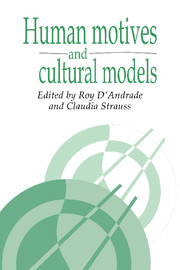Book contents
- Frontmatter
- Contents
- List of illustrations
- Preface
- List of contributors
- 1 Models and motives
- Part I Cultural models as motives
- Part II How do cultural models become motives?
- 4 How cultural systems become desire: a case study of American romance
- 5 The motivational force of self-understanding: evidence from wives' inner conflicts
- 6 The directive force of morality tales in a Mexican community
- 7 Learning to be an American parent: how cultural models gain directive force
- Part III Cultural models as motives reconsidered
- Index
5 - The motivational force of self-understanding: evidence from wives' inner conflicts
Published online by Cambridge University Press: 05 June 2012
- Frontmatter
- Contents
- List of illustrations
- Preface
- List of contributors
- 1 Models and motives
- Part I Cultural models as motives
- Part II How do cultural models become motives?
- 4 How cultural systems become desire: a case study of American romance
- 5 The motivational force of self-understanding: evidence from wives' inner conflicts
- 6 The directive force of morality tales in a Mexican community
- 7 Learning to be an American parent: how cultural models gain directive force
- Part III Cultural models as motives reconsidered
- Index
Summary
This paper takes as its departure point Roy D'Andrade's discussion (1990: 157–9; this volume) of the way in which cultural schemas structure individual goals. D'Andrade observes that the structuring of goals is perhaps the most significant role that schemas play in individual functioning, and that one important way they do so is by defining means–end relationships, linking certain high-level goals to other, low-level, goals. Such goalschemas as those for love and work, by his example, can be thought of as “master motives” that “instigate action relatively autonomously.” Other schemas such as those for marriage and “my job” are middle-level motives that, while they “may on occasion instigate certain actions,” typically “require the presence of other goal-schemas to instigate action” (this volume: 30–1). Thus, presumably, the marriage schema might instigate some actions only in interaction with the love schema, as “job” might instigate other actions only in interaction with work. Still lower-level schemas are those that themselves instigate almost no actions except when other, higher-level schemas are present. An instance might be a schema for sandwich making. It is easy to imagine how this schema might be instigated by hunger. Equally plausibly, it might be instigated in the presence of a marriage schema, part of which has to do with a wife's duty to prepare food and serve it to her husband. The latter schema in turn might be instigated in interaction with still higher-level schemas, performance of a wife's duty being a token of love, perhaps, or essential to a successful marriage.
- Type
- Chapter
- Information
- Human Motives and Cultural Models , pp. 90 - 126Publisher: Cambridge University PressPrint publication year: 1992
- 50
- Cited by

